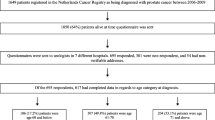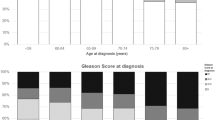Abstract
Background/Purpose
This study examined the relation of age to genitourinary functioning and depressive symptoms over time and examined how age influences the relation between genitourinary functioning and depressive symptoms over time in men treated for localized prostate cancer.
Methods
Participants were 234 men who completed interviews that assessed genitourinary functioning and depressive symptoms at 2, 4, 10 and 16 months after treatment. Analyses were statistically controlled for potential confounds.
Results
Compared with younger men (≤65.5), older men had significantly poorer sexual function and slower improvement. Level of urinary functioning was inversely associated with level of depressive symptoms regardless of age. Level of sexual functioning was inversely associated with level of depressive symptoms but only in younger men.
Conclusion
Interventions may be particularly helpful for all men with urinary dysfunction and for younger men with sexual dysfunction in order to improve symptoms of depression.



Similar content being viewed by others
References
Jemal A, Siegel R, Ward E, et al. Cancer statistics. CA Cancer J Clin. 2008;58:71-96.
Draisma G, Boer R, Otto SJ, et al. Lead times and overdetection due to prostate-specific antigen screening: Estimates from the European randomized study of screening for prostate cancer. J Natl Cancer Inst. 2003;95:868-78.
Michaelson MD, Cotter SE, Gargollo PC, Zietman AL, Dahl DM, Smith MR. Management of complications of prostate cancer treatment. CA Cancer J Clin. 2008;58:196-213.
Blank TO, Bellizzi KM. A gerontologic perspective on cancer and aging. Cancer. 2008;112:2569-76.
Stanford JL, Feng Z, Hamilton AS, et al. Urinary and sexual function after radical prostatectomy for clinically localized prostate cancer: The prostate cancer outcomes study. JAMA. 2000;283:354-60.
Bisson JI, Chubb HL, Bennett S, Mason M, Jones D, Kynaston H. The prevalence and predictors of psychological distress in patients with early localized prostate cancer. BJU Int. 2002;90:56-61.
Diefenbach M, Mohamed NE, Horwitz E, Pollack A. Longitudinal associations among quality of life and its predictors in patients treated for prostate cancer: The moderating role of age. Psychol Health Med. 2008;13:146-61.
Eton DT, Lepore SJ. Prostate cancer and health-related quality of life: A review of the literature. Psychooncology. 2002;11:307-26.
Penson DF, Litwin MS, Aaronson NK. Health related quality of life in men with prostate cancer. J Urol. 2003;169:1653-61.
Lubeck DP, Litwin MS, Henning JM, Stoddard ML, Flanders SC, Carroll PR. Changes in health-related quality of life in the first year after treatment for prostate cancer: results from CaPSURE. Urology. 1999;53:180-6.
Guyatt GH, Feeny DH, Patrick DL. Measuring health-related quality of life. Ann Intern Med. 1993;118:622-9.
Fowler FJ Jr, Barry MJ, Lu-Yao G, Wasson J, Roman A, Wennberg J. Effect of radical prostatectomy for prostate cancer on patient quality of life: Results from a medicare survey. Urology. 1995;45:1007-13.
Perczek RE, Burke MA, Carver CS, Krongrad A, Terris MK. Facing a prostate cancer diagnosis: Who is at risk for increased distress? Cancer. 2002;94:2923-9.
Lepore SJ, Eton DT. Response shifts in prostate cancer patients: An evaluation of suppressor and buffer models. In: Schwartz CE, Sprangers M, eds. Adaptation to changing health: Response shift in quality-of-life research. Washington: American Psychological Association; 2001:37-51.
Helgeson VS, Lepore SJ. Quality of life following prostate cancer: The role of agency and unmitigated agency. J Appl Soc Psychol. 2004;34:2559-2585.
Bacon CG, Giovannucci E, Testa M, Glass TA, Kawachi I. The association of treatment-related symptoms with quality-of-life outcomes for localized prostate carcinoma patients. Cancer. 2002;94:862-71.
Fan A. Psychological and psychosocial effects of prostate cancer. Nurs Stand. 2002;17:33-7.
Moore KN, Estey A. The early post-operative concerns of men after radical prostatectomy. J Adv Nurs. 1999;29:1121-9.
Greimel ER, Padilla GV, Grant MM. Physical and psychosocial outcomes in cancer patients: A comparison of different age groups. Br J Cancer. 1997;76:251-5.
Hewitt M, Rowland JH, Yancik R. Cancer survivors in the United States: Age, health, and disability. J Gerontol A Biol Sci Med Sci. 2003;58:82-91.
Garman KS, Pieper CF, Seo P, Cohen HJ. Function in elderly cancer survivors depends on comorbidities. J Gerontol A Biol Sci Med Sci. 2003;58:M1119-24.
Mor V, Allen S, Malin M. The psychosocial impact of cancer on older versus younger patients and their families. Cancer. 1994;74:2118-27.
Kornblith AB, Powell M, Regan MM, et al. Long-term psychosocial adjustment of older vs younger survivors of breast and endometrial cancer. Psychooncology. 2007;16:895-903.
Schroevers MJ, Ranchor AV, Sanderman R. The role of age at the onset of cancer in relation to survivors’ long-term adjustment: A controlled comparison over an eight-year period. Psychooncology. 2004;13:740-52.
Williamson GM, Shaffer DR. Age and physical functioning. In: Psychology, health and medicine. 2nd ed. Cambridge: Cambridge University; 2007. p. 10–4
Williamson GM, Dooley WK. Aging well: Outlook for the 21st century. In: Snyder CR, Lopez SJ, eds. Coping with stress: Effective people and processes. New York: Oxford University; 2001:240-58.
Prohaska TR, Keller ML, Leventhal EA, Leventhal H. Impact of symptoms and aging attribution on emotions and coping. Health Psychol. 1987;6:495-514.
Lepore SJ, Helgeson VS, Eton DT, Schulz R. Improving quality of life in men with prostate cancer: A randomized controlled trial of group education interventions. Health Psychol. 2003;22:443-52.
Litwin MS, Hays RD, Fink A, et al. Quality-of-life outcomes in men treated for localized prostate cancer. JAMA. 1995;273:129-35.
Litwin MS, Hays RD, Fink A, Ganz PA, Leake B, Brook RH. The UCLA prostate cancer index: Development, reliability, and validity of a health-related quality of life measure. Med Care. 1998;36:1002-12.
Lubeck DP, Litwin MS, Henning JM, Carroll PR. Measurement of health-related quality of life in men with prostate cancer: The CaPSURE database. Qual Life Res. 1997;6:385-92.
Radloff LS. The CES-D scale: A self-report depression scale for research in the general population. Appl Psychol Meas. 1977;1:385-401.
Hann D, Winter K, Jacobsen P. Measurement of depressive symptoms in cancer patients: Evaluation of the center for epidemiological studies depression scale (CES-D). J Psychosom Res. 1999;46:437-43.
Stommel M, Given BA, Given CW, Kalaian HA, Schulz R, McCorkle R. Gender bias in the measurement properties of the center for epidemiologic studies depression scale (CES-D). Psychiatry Res. 1993;49:239-50.
Andresen EM, Malmgren JA, Carter WB, Patrick DL. Screening for depression in well older adults: Evaluation of a short form of the CES-D (center for epidemiologic studies depression scale). Am J Prev Med. 1994;10:77-84.
Zeger SL, Liang KY. Longitudinal data analysis for discrete and continuous outcomes. Biometrics. 1986;42:121-30.
Bennett G, Badger TA. Depression in men with prostate cancer. Oncol Nurs Forum. 2005;32:545-56.
Korfage IJ, Essink-Bot ML, Janssens AC, Schroder FH, de Koning HJ. Anxiety and depression after prostate cancer diagnosis and treatment: 5-year follow-up. Br J Cancer. 2006;94:1093-8.
Potosky AL, Davis WW, Hoffman RM, et al. Five-year outcomes after prostatectomy or radiotherapy for prostate cancer: The prostate cancer outcomes study. J Natl Cancer Inst. 2004;96:1358-67.
Litwin MS. Health related quality of life in older men without prostate cancer. J Urol. 1999;161:1180-4.
Kamath C, Dueck A. Incorporating clinical significance into a study. Curr Probl Cancer. 2005;29:306-16.
Bacon CG, Mittleman MA, Kawachi I, Giovannucci E, Glasser DB, Rimm EB. Sexual function in men older than 50 years of age: Results from the health professionals follow-up study. Ann Intern Med. 2003;139:161-8.
Martin CE. Sexual activity in the aging male. In: Money J, Musaph N, eds. Handbook of sexology. New York: Elsevier-North Holland; 1977:813-824.
Mitchell HS. Testosterone, sexuality, and erectile function in aging men. J Androl. 2003;24:S42-5.
Dahn JR, Penedo FJ, Gonzalez JS, et al. Sexual functioning and quality of life after prostate cancer treatment: Considering sexual desire. Urology. 2004;63:273-7.
Sommers BD, Beard CJ, D'Amico AV, Kaplan I, Richie JP, Zeckhauser RJ. Predictors of patient preferences and treatment choices for localized prostate cancer. Cancer. 2008;113:2058-67.
Shaha M, Cox CL, Talman K, Kelly D. Uncertainty in breast, prostate, and colorectal cancer: Implications for supportive care. J Nurs Scholarsh. 2008;40:60-7.
Ream E, Quennell A, Fincham L, et al. Supportive care needs of men living with prostate cancer in England: A survey. Br J Cancer. 2008;98:1903-9.
Smith DP, Supramaniam R, King MT, Ward J, Berry M, Armstrong BK. Age, health, and education determine supportive care needs of men younger than 70 years with prostate cancer. J Clin Oncol. 2007;25:2560-6.
Steginga SK, Occhipinti S, Dunn J, Gardiner RA, Heathcote P, Yaxley J. The supportive care needs of men with prostate cancer (2000). Psychooncology. 2001;10:66-75.
MacDonald R, Fink HA, Huckabay C, Monga M, Wilt TJ. Pelvic floor muscle training to improve urinary incontinence after radical prostatectomy: A systematic review of effectiveness. BJU Int. 2007;100:76-81.
Matthewson-Chapman M. Pelvic muscle exercise/biofeedback for urinary incontinence after prostatectomy: An education program. J Cancer Educ. 1997;12:218-223.
Latini DM, Hart SL, Coon DW, Knight SJ. Sexual rehabilitation after localized prostate cancer: Current interventions and future directions. Cancer J. 2009;15:34-40.
Schover LR. Sexual rehabilitation after treatment for prostate cancer. Cancer. 1993;71:1024-30.
Hatzimouratidis K, Hatzichristou DG. A comparative review of the options for treatment of erectile dysfunction: Which treatment for which patient? Drugs. 2005;65:1621-50.
Acknowledgement
This work was supported by the National Institutes of Health Grant CA68354. We are grateful to the clinicians and patients who participated in this study, the research staff and consultants, and Thomas Blank for his comments on an earlier draft.
Conflict of Interest
None
Author information
Authors and Affiliations
Corresponding author
About this article
Cite this article
Roberts, K.J., Lepore, S.J., Hanlon, A.L. et al. Genitourinary Functioning and Depressive Symptoms Over Time In Younger Versus Older Men Treated for Prostate Cancer. ann. behav. med. 40, 275–283 (2010). https://doi.org/10.1007/s12160-010-9214-4
Published:
Issue Date:
DOI: https://doi.org/10.1007/s12160-010-9214-4




